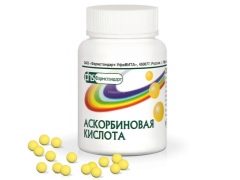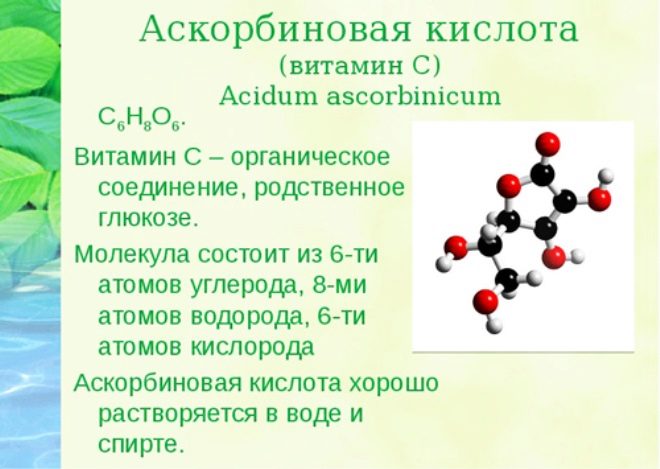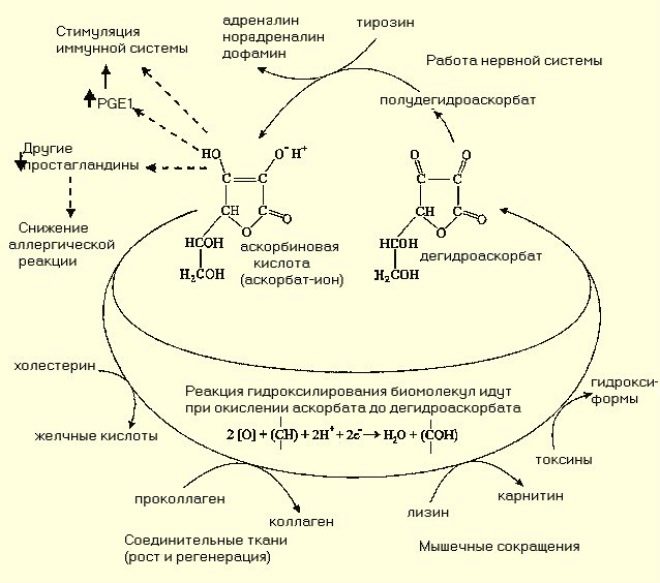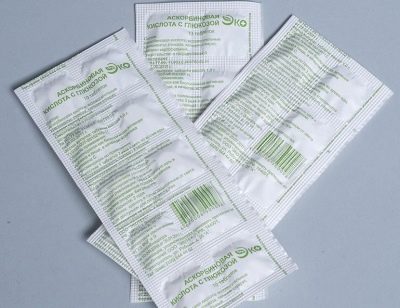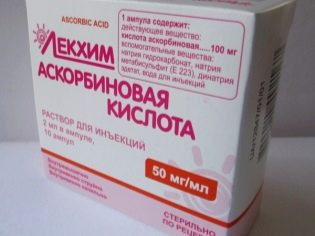Ascorbic acid during pregnancy
The load on the female body during pregnancy increases significantly, so the expectant mother needs more nutrients than an ordinary woman. One of the most important vitamins for a pregnant woman is ascorbic acid. Such a useful compound can be obtained both from food and from a variety of vitamin supplements.
Benefit
Ascorbic acid enhances the body's defenses and helps to neutralize toxic substances that are produced by pathogens. This compound enhances phagocytosis of pathogens, stimulates the production of interferon, reduces the activity of inflammation and makes the body more resistant to infections.
Without the participation of vitamin C, the synthesis of connective tissues is disturbed, in particular proteins called elastin and collagen. They are the basis of cartilage, and also enter into the structure of the skin, vascular walls and bones.
Vitamin C is famous for its antioxidant properties, thanks to which it is able to protect tissues and cells from various harmful effects. In addition, it has a positive effect on liver function, normalizes capillary permeability and is involved in blood coagulation.
Ascorbic acid is able to accelerate the healing of various skin lesions, including burns, cuts and stretch marks. It contributes to a more rapid recovery of the body after injuries or operations. The intake of vitamin C prevents the metabolism of fats, due to which atherosclerosis develops. Moreover, such a vitamin compound has a positive effect on the functioning of the pancreas.
Thanks to ascorbic acid, absorption of iron and folic acid is improved, what is used in the treatment of anemia. In addition, under the action of such a compound active forms of vitamin D are produced and glucose is better absorbed.
What threatens the shortage?
Lack of vitamin C can be suspected when:
- very fast fatigue;
- bleeding gums;
- poor appetite;
- dry and pale skin;
- frequent bruises;
- lethargy;
- hair loss;
- frequent bleeding from the nose;
- impaired wound healing;
- irritability;
- frequent colds;
- joint pain;
- depressed mood.
An unbalanced diet leads to a shortage of ascorbic acid when the requirements for such a vitamin are not fully met. This is facilitated by stress, exercise, infectious diseases, injuries.
Natural sources
Ascorbic acid is most abundant in berries and various fruits, as well as in all types of greens and vegetables. This vitamin can be obtained from:
- red pepper;
- rosehips;
- black and red currants;
- mountain ash;
- strawberries;
- lemons, oranges and other citrus fruits;
- sauerkraut;
- potatoes;
- kiwi;
- apples;
- gooseberry;
- spinach;
- parsley, dill and green onions;
- green peas.
Unfortunately, long-term storage and heat treatment of such products leads to the destruction of a certain percentage of vitamin C, so it is best to use them fresh.
Pharmaceutical preparations
Ascorbic acid can be the main active compound or be part of a multivitamin complex, where it is supplemented with other important vitamins, as well as micro and macro elements. Ascorbic acid monopreparations are available in such dosage forms.
- Round tablets white, orange or pink. The dosage of vitamin C in such a single tablet can be from 25 to 500 mg. Depending on the manufacturer, dextrose, sucrose, crospovidone, lactose, dyes and other substances are added to it.
- Dragee, which have a yellow color and a spherical shape. They often contain 50 mg of ascorbic acid.
- Effervescent tabletswhich, when dissolved in water, form a sweet lemon or orange drink. Usually they include 500-1000 mg of active compound.
- Powder, which is diluted with water for internal use. It is represented by white or colorless crystals, packaged in packages of 2.5 and 1 gram. This powder includes ascorbic acid only.
- Solutionwhich is used for intramuscular or intravenous administration. Such vitamin C is represented by a clear 5-10% liquid, poured into ampoules of 1-2 milliliters. In addition to the active substance, it has sodium bicarbonate, edetate disodium, cysteine and other compounds.
Features of use by pregnant women
The recommended daily dose of ascorbic acid in the period of carrying a child is 70-100 mg. The maximum limit of such vitamin intake during pregnancy is 2000 mg per day.
Despite all the benefits of askorbinki, to receive such a vitamin in the first trimester should be treated with increased caution. Doctors do not recommend in the early stages to drink drugs on the basis of vitamin C, so as not to provoke an abortion.
The fact is that the strengthening of the protective forces during this period can cause the rejection of the embryo, if the mother’s body begins to perceive it as a foreign body. For this reason, in the first trimester, there is enough vitamin from food.
Vitamin C improves skin elasticity in the 2nd trimester, which will reduce the risk of stretch marks on the skin due to an increase in the size of the abdomen. Increased blood volume during this period increases the load on the vascular walls. Vitamin C strengthens the capillaries and reduces the likelihood of varicose veins, protects against bleeding from the nose and gums, and also reduces the risk of placental abruption.
In trimester 3, vitamin C will strengthen the future mom's immunity, normalize vascular permeability and help prevent anemia. Due to such properties, it will not only increase the woman's resistance to colds and bleeding, but will also prevent too early onset of labor. In addition, by increasing the elasticity of the muscles, they will be easier to stretch during labor.
Most often, expectant mothers are recommended to supplement your diet with ascorbic acid with glucose. Such tablets are sweet and have different tastes. Glucose enhances the effect of the vitamin and provides an extra supply of strength, but it requires caution if the pregnant woman has developed gestational diabetes, is overweight or has problems with carbohydrate absorption.
Sometimes, future moms are prescribed injections with vitamin C. This type of medicine is needed in case of bleeding, infections, fractures, intoxication, and other dangerous conditions. The solution can be injected into muscle tissue or into a vein in the form of droppers. The dosage is selected individually.
Preparation for conception
Planning of pregnancy is the same crucial period as gestation, during which the woman should create favorable conditions for the development of the crumbs. And the saturation of the body with vitamins can be called one of the key points for a healthy pregnancy.
The use of ascorbinka is especially valuable for expectant mothers, who had previously smoked and before conceiving, decided to abandon this bad habit.
Besides, Improving the absorption of iron under the influence of vitamin C will prevent anemia, early toxicosis and vascular disorders in the very first weeks after fertilization.
Possible harm
Ascorbic acid is contraindicated for thrombophlebitis, hypersensitivity, elevated hemoglobin levels, severe kidney disease, and some other problems, therefore You should not take pharmaceutical supplements with this vitamin without consulting a doctor.
There are also frequent cases of allergic reactions to ascorbic, which are most often in the form of rashes, itching and redness. In addition, vitamin C supplements may cause other adverse reactions, such as diarrhea, insomnia, edema, nausea, urinary tract stones, dizziness, and so on. Often they are due to the excess of the recommended doses, violation of instructions for use or too long reception.
The daily dose and the duration of vitamin C intake that is suitable for a specific future mother should be checked with the doctor who monitors the woman for the entire period of carrying the baby.
Reviews
About drugs that contain ascorbic acid, respond mostly positively. Expectant mothers like them with their pleasant taste and are considered healthy during the cold season. The advantages of askorbinki also include an affordable price and a variety of dosage forms. Such a vitamin supplement is predominantly well tolerated, but occasionally provokes allergies and other side effects.
